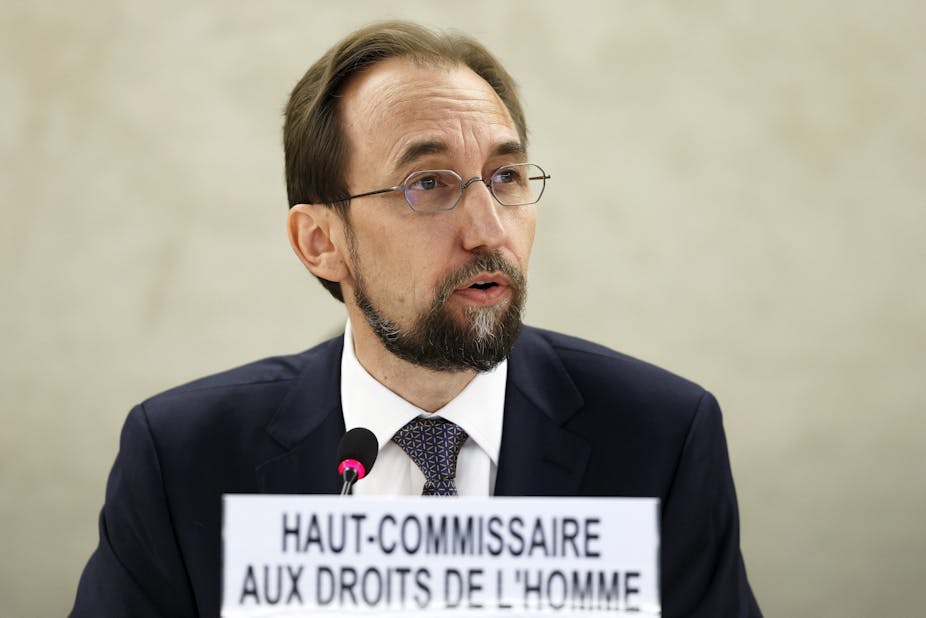The Australian government is being examined on Monday evening by the United Nations Committee against Torture. Before the independent committee of experts, an Australian government delegation has to answer tough questions about Australia’s human rights record with a specific focus on torture.
The question-and-answer session is streamed live. The committee’s conclusions and recommendations will be available online within weeks.
What does the committee do?
The committee monitors states’ implementation of the Convention against Torture and Other Cruel, Inhuman or Degrading Treatment or Punishment (CAT). It does so primarily by reviewing states’ periodic progress reports, asking the government questions on areas of concern, and issuing public recommendations.
Australia was part of the first wave of supporters for the convention. Australia has voluntarily committed to the treaty since 1989. That does not mean Australia always honours its obligations under the treaty, nor implements the committee’s recommendations.
Australian NGOs have identified issues of concern in submissions to the UN committee. A delegation representing Australian NGOs travelled to Geneva last week to give an “informal briefing” to the committee. The committee has reviewed Australia on three previous occasions, most recently in 2008.
Why has Australia agreed to this review?
All states voluntarily choose to be party to international human rights treaties. In so doing, they agree to be reviewed by the relevant committee. The torture convention is very widely accepted. Almost 80% of UN member states committed to the treaty.
No state has a perfect human rights record, which raises the question: why would Australia, or any state, choose to be reviewed in the international arena and risk being subjected to criticism?
The decision to commit to, or ratify, a treaty depends on each state, their level of commitment to human rights in their own country and internationally, the extent to which they rely on international trade or development aid and view this as related to their human rights record, and their desire to be viewed as a good international citizen. The potential benefits are many and the disadvantages few, other than a public “slap on the wrist” from the UN.
What will the committee discuss?

The committee will primarily base its review on a list of questions sent to the Australian government, and the government’s responses submitted in January.
The committee, like most other UN human rights committees, has expressed concern about the practice of immigration detention and ensuring that asylum seekers are not returned to a country where they are at risk of torture. It is also reviewing steps taken to address the over-representation of Indigenous people in custody.
For the first time, the committee is asking questions about Australia’s action on violence against women, including domestic violence. Although traditionally viewed as outside the scope of the torture treaty as domestic violence is not carried out by an “official” as per the definition of torture, there is growing awareness of the need for a gendered analysis of international human rights law.
The Australian government’s report disagrees with the committee’s inclusion of domestic violence, but provides comprehensive responses on the relevant legislation and support services for women experiencing violence.
The committee has also asked about progress in implementing the Optional Protocol to the CAT (OPCAT), which will enable international inspections of places of detention. NGOs in their reports have criticised the slow progress in ratifying the OPCAT.
Like many other UN committees, the committee has also asked about a bill of rights. Australia is the only western democratic state not to have a constitutional or legislative bill of rights.
What happens after the review?
The committee will issue a report with recommendations called “concluding observations”. However, enforcement mechanisms for international human rights treaties are weak. There are no sanctions and no individual criminal responsibility, only the risk of some international embarrassment.
It has been found that where there is a lack of follow-up on recommendations by NGOs and human rights institutions at a national level, implementation of recommendations can be poor.
It then falls to NGOs within Australia to garner public support for the recommendations and hold the government to account.
What are the implications for Australia?
Having secured a seat on the UN Security Council, Australia has indicated its intention to bid for a seat on the UN’s primary human rights body, the Human Rights Council, in 2018. Australia’s current international human rights image does not augur well for this contest.
For example, the new UN High Commissioner for Human Rights, Zeid Ra'ad al Hussein, criticised Australia’s asylum policies in his high-profile opening address to the Human Rights Council. He singled out a number of states or regions of concern, including Israel–Palestine, Sri Lanka, the Democratic Republic of Congo and South Sudan. Australia was one of the very few western states highlighted.
A less-than-perfect human rights record does not preclude a state from membership of the Human Rights Council, but it must demonstrate willingness to provide redress and make improvements. Criticism by the UN Committee Against Torture is not something that any state wants, particularly not one seeking a seat on the Human Rights Council.

